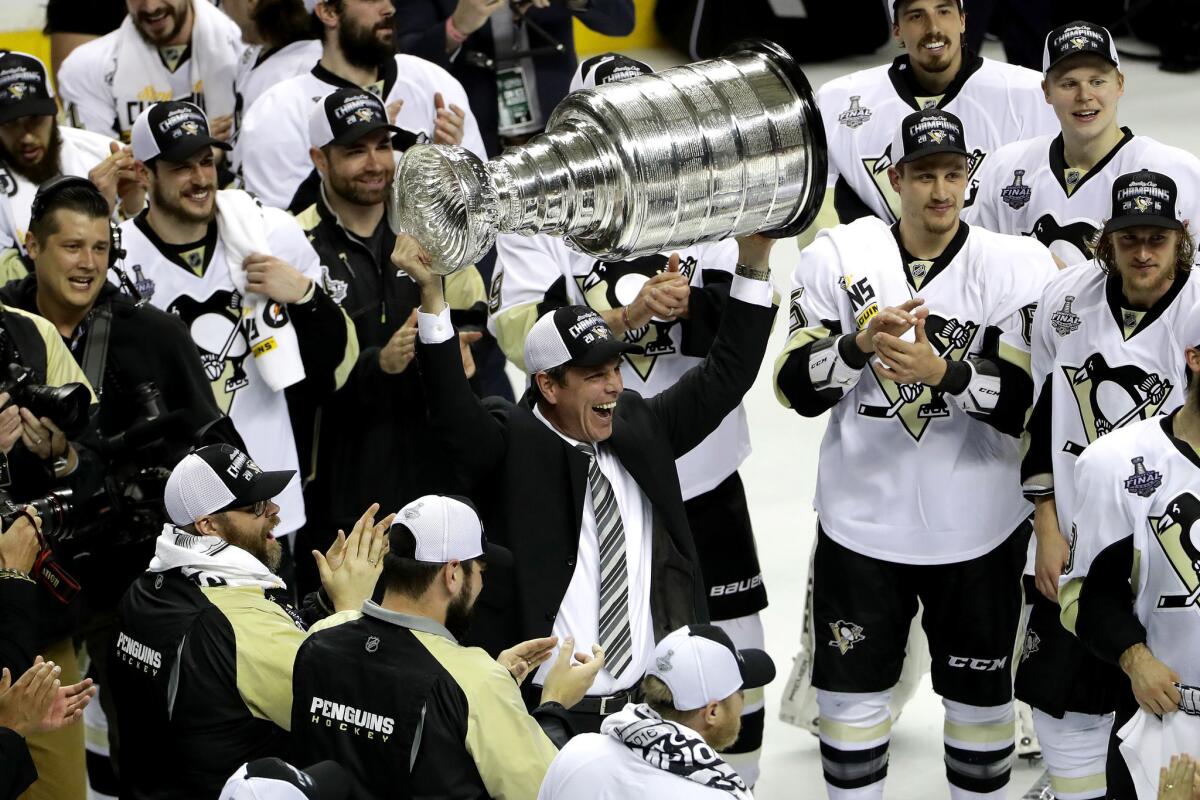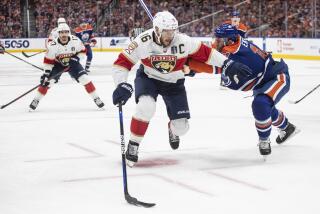Column: Midseason changes sparked run that carried the Pittsburgh Penguins to the Stanley Cup championship

The Pittsburgh Penguins’ Stanley Cup triumph is good news for teams built around speed and youth but it might be bad news for coaches who have been entrenched in one place for a while.
When things were looking dim for the Penguins around mid-season, General Manager Jim Rutherford changed coaches — from Mike Johnston to Mike Sullivan — and called up several youngsters that Sullivan had coached with Wilkes-Barre (Pa.) of the American Hockey League, most notably forwards Bryan Rust and Conor Sheary. The kids brought energy and added speed to a team that could outpace nearly anybody when the defense got the puck up quickly to the forwards and let them fly. Acquiring fleet left wing Carl Hagelin, who had inexplicably failed to click with the Ducks, gave them more speed and enough depth to assemble three impressive scoring lines.
Six months to the day after the Penguins promoted Sullivan, they completed a six-game Cup victory over the gritty but outclassed San Jose Sharks.
“I don’t think you could expect it,” defenseman Ian Cole said Sunday while players lingered on the ice at SAP Center in San Jose to celebrate. “When we were at that point in December or maybe January, when we hit our low point of the season, there was a lot of frustration built up. There were a lot of guys frustrated over how they were playing and how the team was playing.
“But I don’t think anyone ever doubted that we had a very special team that could potentially go all the way. I think we were still really confident in the players we had. We just had to figure out some things. We figured them out, and then you saw how well we ran with that at the end of the year and then continued that right through the playoffs.”
But without Sullivan to guide them through the process, the Penguins would not have been hugging each other and their families Sunday while marveling at the path they took to earn the franchise’s fourth championship.
Sullivan is the sixth coach in NHL history to win the Cup after taking over at mid-season and the first since the Kings hired Darryl Sutter to replace Terry Murray in December 2011. Sullivan provided the clear, smart direction players needed and craved and, much as Sutter did with the Kings, Sullivan gave the Penguins an identity. Sutter played to the strengths of his personnel by emphasizing a heavy, punishing game and enhancing the defensive foundation Murray had put in place. Sullivan also maximized his resources and pushed a speed game that turned opponents’ defenses inside out. He held players accountable, challenged them to turn things around together. Penguins captain Sidney Crosby bought in. Everyone else followed.
“After a coaching change, I think everyone takes that personal, puts the responsibility on their shoulders to be better,” Crosby said. “I think individually and as a group we had high expectations, we knew we needed to be better. I thought we just slowly got better and better.
“Mike came in and made it pretty clear how he wanted us to play, what he expected from each individual guy. I think guys just welcomed the opportunity, welcomed the challenge, tried to get back on track.”
Crosby won the Conn Smythe Trophy as the most valuable player of the playoffs, a choice that was debated because he had no goals and four assists in the Cup Final and ranked seventh in playoff scoring with six goals and 19 points in 24 games. But his fire in Game 6 was a galvanizing force, and his overall play reflected the Penguins’ evolution into a team after too many seasons of being a bunch of stars skating around the same rink.
“We’ve been through an awful lot this year and we really became a close-knit group and it was pretty cool how everybody seemed to play a special part as we went through the end of the year and into the playoffs,” said center Matt Cullen, 39, who had won the Cup with the Carolina Hurricanes in 2006. “Everybody shares a big piece of it. It’s truly a team win.”
The Cup winner’s style usually becomes a blueprint for those who fell short, so look for an increase in the trend toward speed, finesse and team defense and away from big, heavy lineups. And if a team is underperforming, its general manager might be more likely to change coaches in midstream in search of a fresh voice. Rutherford found the right guy and made the switch at the right time, producing an outcome that seemed impossible six months ago.
helene.elliott@latimes.com
Twitter: @helenenothelen
More to Read
Go beyond the scoreboard
Get the latest on L.A.'s teams in the daily Sports Report newsletter.
You may occasionally receive promotional content from the Los Angeles Times.







